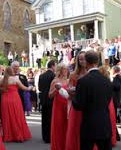 One of the more surreal evenings I’ve spent in a good long while happened on Saturday when I went to Central City, CO, an old gold mining town in the Front Range turned gambling hotspot. I was in town to experience opening night of The Central City Opera‘s 2103 season, which includes The Barber of Seville (which I saw), Ned Rorem’s Our Town, and Show Boat (in Denver.)
One of the more surreal evenings I’ve spent in a good long while happened on Saturday when I went to Central City, CO, an old gold mining town in the Front Range turned gambling hotspot. I was in town to experience opening night of The Central City Opera‘s 2103 season, which includes The Barber of Seville (which I saw), Ned Rorem’s Our Town, and Show Boat (in Denver.)
The Central City Opera is a fascinating institution, not least because its perched in the hills at high altitude, which must be tough on the singers. Built in 1878Â by Welsh and Cornish miners, the building houses the country’s fifth oldest opera company. In its glory days at the turn of the last century, it hosted P T Barnum’s Circus and Buffalo Bill. Lillian Gish performed there in the 1930s after the 550-seat house had been restored following years of disrepair.
Judging by this one production I’ve witnessed first hand, the company is doing high-quality work these days: The Central City Opera’s production of The Barber of Seville brims with energy. I particularly love mezzo soprano Jennifer Rivera’s no nonsense Rosina. Instead of cowering in front of the feckless bully Dr Bartolo, she maintains a haughty dignity that’s in stark contrast to the cage-like circumstances in which she’s entrapped. My favorite voice of the production belongs to the tenor David Portillo as the Count. Portillo’s voice glistens at the top and combines lightness and gravity in equal measure. Daniel Belcher’s gives the best acting performance in my opinion. Belcher doesn’t have as much facility in his voice as some baritones I’ve heard in the role. He scratchily sprechgasanged the famous title song of Act 1 — I imagine the fast passages are particularly challenging at altitude. But the performer has an endearing, clown-like energy about him and you can’t help being taken in by his broad smile and charisma. The orchestra played tightly under the baton of conductor John Baril. The piano sounded a little jarring for the recitative passages, however. And the chorus did a wonderful, robust acting and singing job.
What made my time in Central City particularly memorable, however, was the weird incongruity between what was going on at the opera house on Saturday night versus the atmosphere in the rest of the small town. The casinos — the only places in Central City to get an evening meal — were mostly pretty empty. A few people in shorts and t-shirts stared blankly at slot machines or sat at poker tables. (I wish that there were one decent place to get a meal before the show during the Opera season. But this sadly isn’t the case. It’s pizza or chicken nuggets or nothing. The Opera company should work on that.)
Up the hill at the opera house, though, the scene was very different. At around 5pm, there were roughly a hundred people dressed in their finery dancing waltzes to classical string music in the street.
It turned out that I had stumbled upon Central City’s annual debutante coming out parade. Dozens of sweet sixteens dressed in matching peacock blue ball gowns wobbled about on their heels on the street cavorting with their pimply young beaus in white tuxedos. The older generation, equally gussied up, stood about and danced. It wasn’t performance art, but it was certainly a performance. Don’t you love it when a show is more than what happens under a theater’s roof? On Saturday, the  whole of Central City felt like it was part of an unusual, mixed-up rite.
P.S. If my iPhone hadn’t run out of juice, I would have taken pictures. Instead, for the purposes of this blogpost, a similar shot of the cotillion from another year will have to suffice to suggest the pre-performance atmosphere. (You can tell that the image isn’t from 2013 because the  girls are sporting red rather than blue frocks.)
